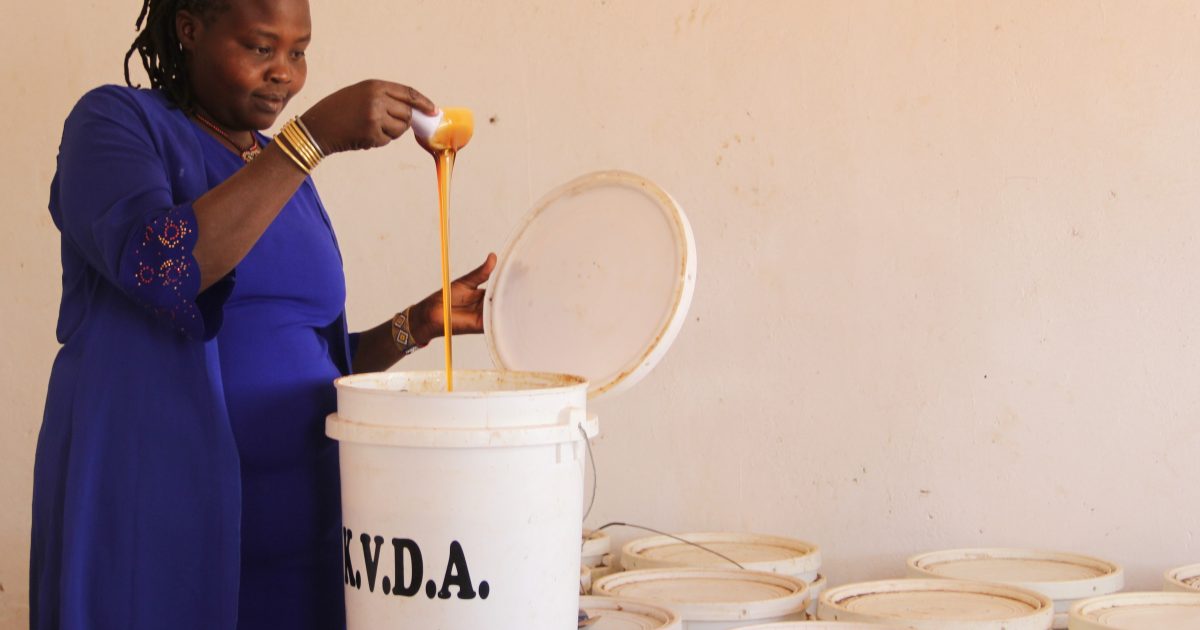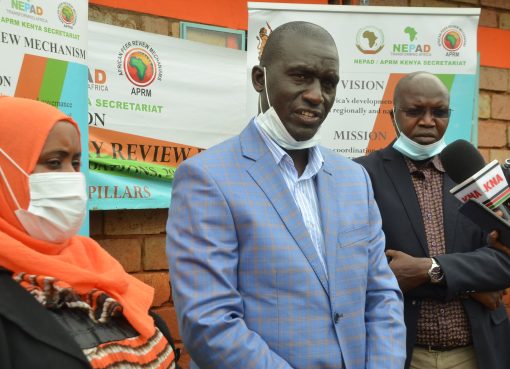The Kerio Valley Development Authority (KVDA) through its pillar of promoting sustainable development has been keen to support pastoral communities in the north rift region diversify to bee keeping as an alternative source of employment to support livelihoods
In its programs, KVDA does capacity building to farmers to equip them with elaborate skills in handling and production of honey through adoption of modern methods of bee farming to produce more and good quality honey as compared to traditional ones which not only yield little but also compromised quality hence fetch low market value.
In an interview with the Kenya News Agency, KVDA Managing Director Sammy Naporos pointed out that, due to the prevailing economic conditions, small stock like bee keeping is the way to go adding that bee keeping in ASALs is more of a lifeline like dairy, coffee and tea farming in central and other parts of Kenya.
He noted that they had seen a lot of benefits for those practising bee keeping in ASALs areas adding that it is the most sustainable source of livelihoods because it does very well ASALs due to the favourable ecological conditions like availability of flowering acacia trees, water among others.
He further pointed out that bee keeping comes out strongly as an alternative to big stock because big stock like cattle, goats and camel are susceptible to drought and a farmer is likely to lose in big numbers but with bees the rain of two weeks is enough to regenerate flowers and a farmer will be able to harvest honey within a period of 90 days.
Additionally, livestock are the main cause of conflict as neighbouring communities fight from time to time to steal cattle from one another but with apiculture members of the communities can carry out their activities peacefully since cattle rustlers do not target bee hives but big stock like cattle, camel and goats.
“We have seen a lot of shifts and that is what we want to encourage farmers, for example if you have two to three bee hives and you are able to harvest an average of about 15kgs per hive and you sell a kg at a minimum of Sh300 then you have 4500 from one beehive; if you have a farm and maybe you have 20 hives, then you may not require cows,” said Naporos.
“We have a number of programmes; we do capacity building, the challenge we have in Kenya in terms of bee keeping is that majorly it is done the traditional way so the quality of the honey is mostly compromised, on training and development, we train farmers on handling of honey, to understand when it ready for harvest, the extraction of honey from the combs, handling of the same and the storage which is also very sensitive in terms of concentration,” he said.
Naporos reiterated that the authority focuses on the provision of improved bee hives like Langstroth and Kenya top bar hives that lead to high quality and quantity to meet the high demand in the market. He added that KVDA is engaging artisans to produce hives in large numbers so as to produce more honey by engaging many members of the communities in ASALs.
“Hives use specific kind of wood for example, the Langstroth bee hive made of Cypress, is able to give an average of between 18 kg to 20 kgs of honey as compared to traditional bee hive made of wood and logs which yields about 5kgs to 6 kgs of honey, so we are able to triple the quantity with the modern bee hives,” explained Naporos.
Besides empowering the famers through training and provision of modern bee hives, KVDA provides ready market to farmers by buying the semi-processed honey at its various catchment areas like Kodich, Kacheliba and Konyao in West Pokot, Tiyati, Chemolingot and Kolowa in East Pokot, some parts of Baringo and Elgeyo Marakwet counties.
The semi-processed honey is transferred to the KVDA factory at Rokocho in Elgeyo Marakwet for processing, packaging and distribution to the entire country.
KVDA, known to be the largest up-taker of honey in the north rift region, plays a vital role in regulating pricing in the market to protect farmers from over-exploitation by middlemen. The authority currently buys the semi-processed honey from farmers at Sh380 per kg making all other buyers to buy at its rate.
“Once we are able to regulate the pricing and depending on the demand and supply then everyone buys at the KVDA rate because if they don’t buy at that price, then the KVDA has the capacity to process all the honey,” said Naporos.
Noting that the quality of the honey is very important, the MD noted that they we have been able to sustain high level of quality up to the larger markets, earning KVDA Acacia Honey a good reputation in market.
In the move to empower the cooperative societies in ASALs to thrive through bee keeping, Naporos said that KVDA is planning to utilize up to Sh60 million in this financial year in the purchase of semi processed honey that is brought to the factory for processing, packaging and distribution to the entire country.
The managing director said that there are other programmes underway with the International Fund for Agricultural Development (IFAD) that would be commencing soon to double the production of honey and commercialize bee keeping in 10 counties of western and north rift regions.
He noted that the authority is looking forward to scale up measures to enhance the capacity to triple honey production from the current 100 to 120 tonnes annually to 320 tonnes annually in the north rift.
The MD said KVDA’s move to empower communities through beekeeping comes at a time when the country has a deficit of about 50 per cent of honey in the Kenyan market according to a report by the Kenya National Bureau of Statistics (KNBS).
“Most of the honey that is in the market in Kenya is actually imported from Tanzania through the Namanga border, most of the KVDA honey over 80 per cent is from Kacheliba in northern Pokot, acacia honey is the best in terms of purity, medicinal value and in terms of the content,” said Naporos.
Naporos said that the main challenge in the country is lack of certified laboratories specifically for honey which hinders export of the product as he noted that the KVDA’s Acacia Honey is certified with KEBS for local consumption only.
“The challenge we have as a country is we don’t have certified laboratories for honey, we are certified with KEBS for local consumption but for you to be able to export to Europe and other continents you will require a certain level of certified labs for honey,” he noted.
KVDA Director of Business Development Mr. Samuel Koskei said this is a livelihoods program to promote the communities in regions where honey is sourced from through investing in bee keeping and selling honey.
He added that in the honey value chain, the authority provides quality beehives which are made in Kabarnet, to improve the output of honey so that farmers are able to practice the modern way of beekeeping which helps in environmental conservation.
“After processing, we package our honey into 1kg, 500 grams,300 grams and 20 grams and distribute to various locations like Eldoret, Nairobi, Samburu, Lodwar among other outlets where they are sold at wholesale and retail prices,” said Koskei.
Famers from the KVDA’s main catchment areas in West Pokot have lauded the authority for the initiative, saying the program has helped transform their lives by enabling them to cater for their various needs like buying food, building houses, paying for school fees among others.
Lucy Maira, a representative of Achawa women group in Kodich, Kacheliba in North Pokot, said several places across West Pokot County had been affected by the prolonged drought brought about by effects of climate change affecting pastoralism and charcoal making which are the major economic activities in the area.
“People in the region have started to diversify their operation to offset the animals’ losses from drought and venture into beekeeping which has since been a lucrative alternative source of income to send children to school and cater for other domestic needs,” said Maira.
She said the group received a boost when KVDA provided them with training on beekeeping and honey harvesting techniques, this involves using bee smokers and bee suits which are gentler on bees while protecting the beekeepers.
“We have been provided with modern beehives to boost honey production as the hives have higher yields than traditional ones, we harvest two times a year, in a season a farmer can harvest 60 to100 kgs depending on the season,” she said.
Stella Chelimo, a young farmer from Pambamut honey group in Kacheliba who has been able to take care of her younger family after her husband divorced her, said there was need to enhance bee keeping by sensitizing more youths on bee keeping as a business as an alternative source of employment to many idle youths in the area who end up engaging in cattle rustling activities posing insecurity to the residents.
On his part, William Koyolo, from Nakujit honey group said the loss of animals in raids and drought was a big loss to the community, and since the introduction of beekeeping they are no longer troubled by livestock raiders as they do not target beehives and honey.
“Most people now understand that diversifying to other sources of income can enable them to educate their children and meet their families’ basic needs,” said Koyolo.
By Ekuwam Sylvester and Judy Too




